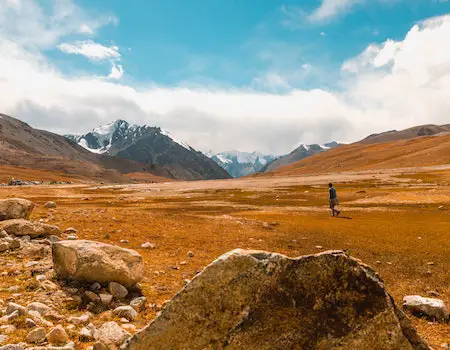If you’re interested in hunting in Pakistan, you’ll want to make sure you get the right kind of binoculars. This will give you the best opportunity to see all the animals and sights. Before you buy binoculars, you should ask yourself what you’re going to be using them for and where you will be hunting. You’ll also need to determine if you are allowed to hunt in the area you are planning to visit.
Make sure to check out these other helpful articles too!
- Best low-light binoculars for hunting
- Best Binoculars For Hunting Under 400
- Best Night Vision Binoculars
how to choose binoculars for hunting in Pakistan?
If you’re in the market for a pair of binoculars, you’ll be happy to learn that you don’t have to pay top dollar to be awed by the natural world. Choosing a pair of binoculars is a matter of identifying the features and functions of the binoculars, and comparing the products you’re interested in.
A binocular is a device consisting of two telescopes mounted side by side. It can provide a view of a target several kilometers away. In addition to providing a view, they are also useful for tracking wildlife, identifying sex, and helping to identify and scout the area surrounding the game you’re hunting.
For example, a pair of binoculars with an objective lens of 42/50/52 mm will provide an impressive view of an area that’s two miles away, but isn’t too useful in a field of 100. Binoculars with larger lenses can weigh you down and are better suited for low-light conditions.
A pair of binoculars with an objective of ten or more may be too big for the task. Fortunately, there are smaller binoculars on the market, and those are well worth the price. When compared to more expensive binoculars, the smallest ones are not so small after all. Purchasing the right binoculars for your needs is a matter of testing, testing, and more testing.
As you can see, there are numerous factors that go into the selection process. But, the most important part of the selection process is selecting the right binoculars for the job.
How do I choose the right binoculars for hunting?
When shopping for binoculars, the first thing to consider is magnification. For most hunters, a pair of 10x binoculars will suffice. However, if you are an avid bow hunter or plan on catching a hog on the range, it is prudent to opt for a smaller form factor.
There are a number of ways to choose the best binoculars for your hunting needs. Some of the more practical features to look for are lightweight, multicoated optics, and good color reproduction. You will also want to consider the type of binoculars you are getting.
In particular, you want to look for binoculars that have a tripod socket. This allows you to mount your binoculars onto a tripod for optimal viewing.
Another important factor to take into consideration is the field of view. The more magnification you get, the more narrow your field of view will be. That is why you may want to consider a pair of binoculars with a wide-angle lens. Having a wider field of view will make it easier for you to find and track animals.
Lastly, the best binoculars for your hunting need will have the highest quality lenses. Good quality lenses help to produce a clear and bright image. If you’re planning on taking a picture with your binoculars, you may also want to consider a pair with a perma-focus lens.
Is hunting allowed in Pakistan?
The wildlife in Pakistan is rich in diversity and includes a large variety of species. However, the population of some species is decreasing. This has led to a ban on hunting in some areas.
Hunting is allowed in the northern and southern areas of the country. Hunters are required to have good physical fitness and some basic climbing skills. They may also need ropes or ice axes to complete their hunt.
Hunting permits are issued by the government to individuals. However, there are restrictions on certain species. Some of the most endangered animals are illegal to hunt.
Wildlife is a protected animal in Pakistan and any attempt to capture or kill any of these species is illegal. Violators will face arrest and their weapons confiscated.
Trophy hunting is held in Pakistan for several animals. The proceeds from these hunts aim to support endangered species. To get a permit for these hunts, you need to pay a certain amount. These fees range between $80 and $120,000.
The Wildlife Department will issue a limited number of hunting permits to hunters. The permits are only issued in accordance with the rules of wildlife law.
The hunting season in Pakistan starts in October and ends in April. It may be extended on request. During the hunting period, the authorities will monitor the hunts to prevent the destruction of endangered species.
Where can you hunt in Pakistan?
Pakistan is a great place to go hunting. The country is home to some incredible game species, many of which are rare. Hunting in this country requires good physical shape.
A recent study found that trophy hunting in Pakistan has helped boost the population of the country’s national animal, the markhor, whose numbers had dwindled over the years. Furthermore, it has helped generate a significant amount of revenue. Some of the money has been spent on improving local community programs, and in turn, helping the community.
Although the trophy hunting program has been criticized for a few missteps, it has also been credited with reducing poaching. In fact, the Government of Pakistan recently announced an audit of trophy hunting revenues. Hopefully, this will help to ensure transparency and accountability in the future.
In addition to the obvious, the markhor trophy hunting program has been an important contributor to Pakistan’s economy. Between 1995 and 2020, the program generated nearly four billion rupees, which has been spent on community development. Additionally, CITES has hailed the program as a conservation success story.
The government of Pakistan’s Department of Wildlife and Climate Change is a big fan. In fact, the organization has hailed the program as one of the country’s best conservation initiatives.
While trophy hunting has been a controversial topic for decades, the Government of Pakistan is putting a positive spin on it. For instance, it has partnered with NGOs and private companies to improve community programs. This has led to some success stories, including the Siberian ibex trophy hunting program.
Can you hunt deer in Pakistan?
A hunt in the northern highlands of Pakistan is not for the faint of heart. As is the case with most agrarian societies, the savviest of hunters will need to bring along the right equipment and a bit of discipline. The best bets are the locals, who are usually more than willing to share their turf with the yuletide comers.
If you’re fortunate enough to get a place in the sun, the resulting adventure will be a memory for a lifetime. Although the vast majority of hunters opt for the traditional game of chess and fowl, some are lucky enough to be able to spend their time hunting tigers, jackals, and the occasional cheetah.
One can be assured that if they are able to put down the hounds, there will be some meat on the bone.
For a list of requisites, the best places to start are the provinces of Punjab and Sind. While the hunts of these areas are not as rigorous, it’s a well-known fact that they are less crowded than the southern regions, and thus offer more opportunities for scoring the elusive big buck.
This is in addition to the fact that the aforementioned critters are usually more forgiving and are willing to budge a bit.
Fortunately, the region’s wildlife etiquette is spot on, and visitors should expect to be treated like royalty by the time they leave.
Is trophy hunting legal in Pakistan?
Pakistan is home to a variety of iconic species including Himalayan blue sheep, Punjab urial, Afghan urial, and two species of hog deer. However, trophy hunting has been banned since the early 20th century. It was only after the ban was lifted in the 1990s that the country was able to launch a controlled trophy-hunting program.
In the early 1990s, then-Prime Minister Muhammad Nawaz Sharif approved a proposal by Ashiq Ahmed Khan to implement a community-based trophy-hunting program in Gilgit-Baltistan. This would strike a balance between the conservation needs of mountain ecosystems and the livelihood needs of local communities.
The community-based program is incentive-based and is designed to promote biodiversity conservation and protect marginalized populations. While the revenue generated is spent on biodiversity conservation, most of the money goes to local communities.
The government of Pakistan recently announced an audit of the revenues derived from trophy hunting. The total amount was USD 4.86 million, with 80 percent going to the local communities. A portion is also spent on social, economic, and environmental development.
The trophy hunting program in Pakistan is overseen by the National Council for Conservation of Wildlife (NCCW), a scientific management authority of CITES. CITES has welcomed the progress of the trophy hunting program, but it has noted some gaps in its implementation.
Trophy hunting in Pakistan has proven to be a successful conservation effort, although some registered operators have failed. Private sector players can help improve the effectiveness of the program.

